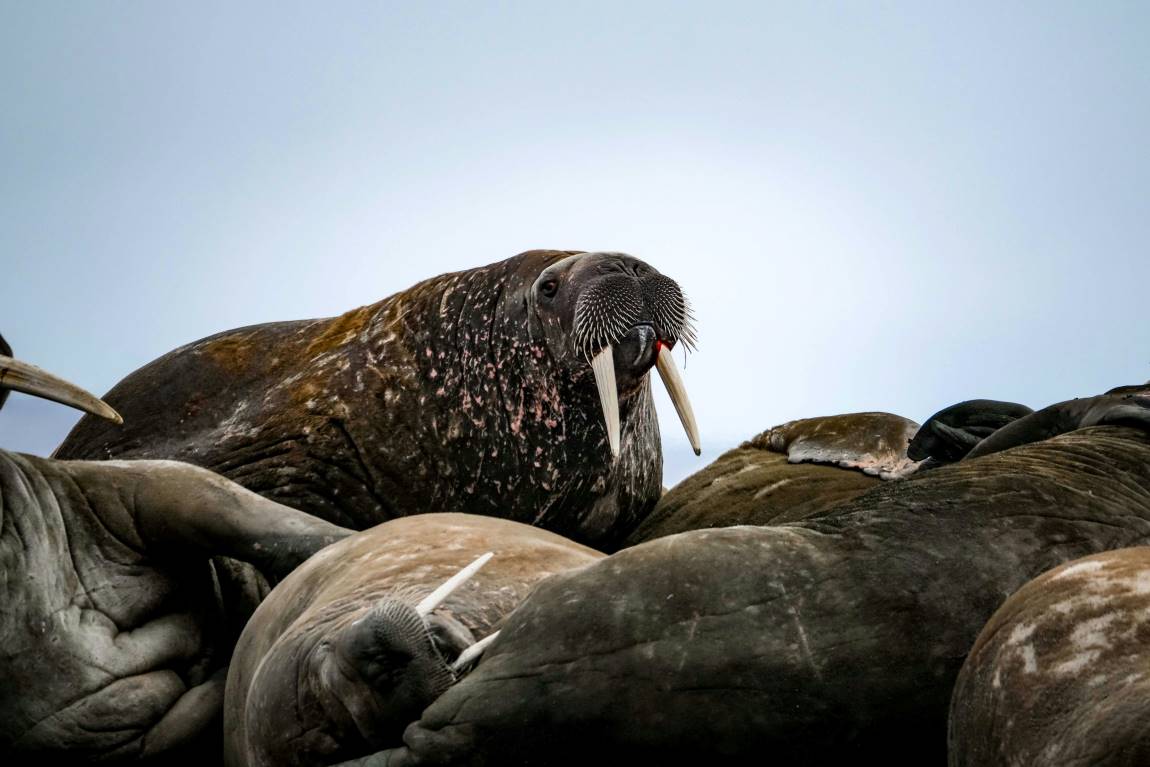Pacific walruses, a vital subsistence resource for Indigenous Arctic communities – Alaska and Chukotka Native communities – face dual threats from climate change and human activity.
A study published in The Journal of Wildlife Management used a population modeling framework to evaluate sustainable harvest strategies for this vulnerable species under a range of climate and disturbance scenarios.
The research focused on the independent-aged female walrus population, using a theta-logistic model to simulate population dynamics through the 21st century.
Four climate scenarios, based on sea ice projections, ranged from optimistic to highly pessimistic conditions. Two types of harvest strategies were assessed: state-dependent harvests, where harvest levels adjust periodically based on population reassessments, and annually consistent harvests, where harvest levels remain fixed over time.
The study found that, even without harvesting, Pacific walrus populations are likely to decline under all climate scenarios due to habitat loss from diminishing sea ice and increased human activities in the Arctic. However, the researchers identified a sustainable state-dependent harvest rate of 1.23% of the independent-aged female population. This rate, which corresponds to about 1,280 females in 2020, matches current harvest levels and remains viable under all climate scenarios when paired with periodic population reassessments and adaptive management.
In contrast, fixed annual harvests of the same number posed a greater risk to the walrus population. Under three of the four climate scenarios, this approach did not meet sustainability criteria and showed a higher probability of quasi-extinction. The findings highlight the risks of ignoring population dynamics when setting harvest levels, especially as environmental pressures increase.
Lead researchers emphasized the importance of adaptive management in mitigating these risks. The modeling framework developed in the study could be applied to other species facing similar challenges in a rapidly changing climate, providing a tool for balancing conservation with the subsistence needs of Indigenous communities.
“This modeling framework can be used by managers and stakeholders to explore future scenarios and promote the continued sustainability of the Pacific walrus population,” said corresponding author Devin L. Johnson, PhD, of the U.S. Fish and Wildlife Service.
***
About Wiley
Wiley is a global leader in research and learning, recognized as one of the world’s largest publishers and a trusted partner in advancing knowledge. With a focus on empowering researchers, students, instructors, professionals, institutions, and corporations, Wiley provides industry-leading content, services, platforms, and knowledge networks designed to adapt to the evolving needs of its customers.
For over 200 years, Wiley has been dedicated to unlocking human potential, helping knowledge-seekers transform today’s challenges into opportunities for tomorrow. Through innovation and a commitment to excellence, Wiley continues to drive progress in education, research, and professional growth worldwide.
Journal Reference:
Devin L. Johnson, Joseph M. Eisaguirre, Rebecca L. Taylor, Erik M. Andersen, Joel L. Garlich-Miller, ‘Assessing the sustainability of Pacific walrus harvest in a changing environment’, The Journal of Wildlife Management e22686 (2024). DOI: 10.1002/jwmg.22686
Article Source:
Press Release/Material by Wiley
Featured image credit: Francesco Ungaro | Pexels




